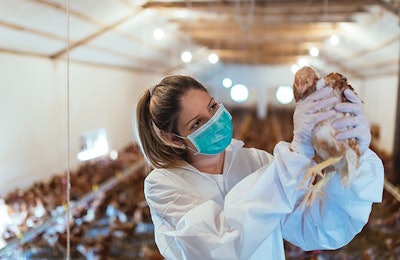
This week has seen the official launch of the One Health Poultry Hub, bringing together 11 countries and 27 organizations from across continents to address the potential public health problems that can be associated with rapid intensification in poultry production.
The fast development of any industry can bring with it its own issues, and the poultry industry is no exception. Rapid expansion of chicken and egg production may help to quickly satisfy demand for food but, if poorly managed, can pose a variety of disease risks for flocks and consumers.
Some areas where demand for poultry meat is expected to grow the most may be those least able to cope with any problems, and given that disease knows no borders, any problems that emerge may not be restricted to where they arise.
The hub, which is being led by the U.K.’s Royal Veterinary College (RVC), will concentrate efforts in Bangladesh, Sri Lanka and Vietnam, and will look at why intensification of poultry production increases the risk of infectious disease, and identify high-risk behaviors, processes and environments. It will also test and evaluate novel interventions for disease control.
With backing of GBP19.1 million (US$2.5 million) in funding for the U.K.’s Global Challenge Research Fund, this new hub, one of a series of 12 hubs which seek to develop solutions to make the world “safer, healthier and more prosperous,” brings together teams of laboratory, clinical, veterinary and social scientists to create a One Health approach to the challenge of providing safe, secure food.
Golden opportunity
Professor Fiona Tomley of the RVC believes the hub will assist in the development of policies for the environmental, economic and social sustainability of poultry production systems and reduce threats to human and animal health and welfare.
Among areas of concern for collaborators in the hub are bacterial food poisoning, avian influenza and antimicrobial resistance.
According to Ruwani Kalapahana, of Sri Lanka’s University of Peradeniya, the initiative provides a “golden opportunity” to share knowledge and technical know-how among collaborative countries while providing the benefit of capacity building to improve quality standards, assuring food safety for consumers.
The One Health approach recognizes that human, animal and environmental health are interrelated, and so collaborative, interdisciplinary efforts in research, policy and management of zooneses are needed.
Research is due to start next month and evidence generated will be put to immediate use by “those that can make a difference.”

















